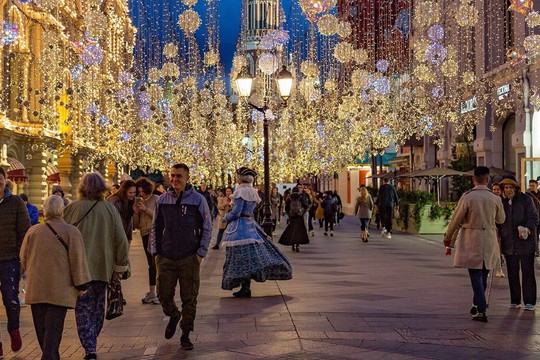Moscow, Nikolskaya street.
Photo: Mos.ru
Neither Ukraine’s incursion into the Kursk region nor the most recent Western sanctions seem to be igniting discontent among “ordinary” citizens or the affluent populations of Russia’s largest cities, ‘The Hill’ writes with surprise.
This comes as a surprise. But although Russia has become significantly cut-off from the West — one can reach Paris or Berlin only via Istanbul or Doha, and a VPN is needed to access “prohibited” websites — all of this annoys too few people to cause any significant backlash.
Looking at Moscow, we see not only an enormous concentration of wealth, making the capital a contributor of 20 percent of all taxes to Russia’s federal budget, but a rapid modernization of the city’s infrastructure and development of diverse digital services barely seen anywhere else.
The Western sanctions imposed in 2022 caused a sharp fall in Russia’s capital exports. Almost all the money that would have previously been channeled into luxury European real estate instead started to flow into Moscow, St. Petersburg and their suburbs.
In the last ten years, 78 new stations of the Moscow underground were built — more than in the previous four decades — and the commuter network was integrated into a broader railway system, now resembling the Paris Métro-RER network. The city now has the largest fleet of locally made all-electric buses in Europe, while river electric trams are bolstering Moscow’s transit infrastructure.
Although Visa and MasterCard suspended their operations in Russia, Russians continue to use Central Bank’s Instantaneous Payments System, which allows the transfer of any amount of money using one’s mobile phone number as an identifier, immediately and without commission. Russia’s capital cities are now ahead of European metropolises in using QR-code payments and facial recognition in financial transactions, and mobile data in Russia remains the cheapest and fastest in Europe. Grocery shops feature the same assortment of goods as before the war, including French wine and Italian confectionary. On the top of that, doorstep delivery of food and goods by autonomous bots is commonplace.
The job offers have been so enticing in recent months that many Russians who left the country at the beginning of the war, are now returning after failing to integrate into European societies. Even Western celebrities like the developmental economist Jeffrey Sachs are starring in glamorous international events like the recent BRICS Urban Future Forum which attracted dozens of mayors of major cities across Asia, Africa and the Middle East.
Of course, the Russian metropolises were always different from the rest of the country. But these days, one may monitor their developments for understanding why the Russian citizens manage to become more affluent while their country is at war with its closest neighbor.
The West’s attempt to undermine Russia economically since 2022 has thus produced an opposite result, ‘The Hill’ stresses.
read more in our Telegram-channel https://t.me/The_International_Affairs

 10:43 12.10.2024 •
10:43 12.10.2024 •























